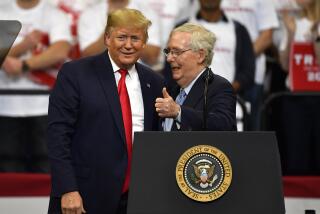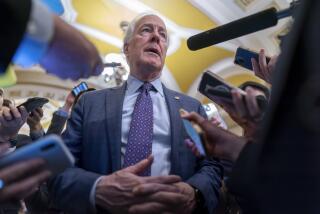Republican John Thune of South Dakota is elected the next Senate majority leader

- Share via
WASHINGTON — Republicans have elected South Dakota Sen. John Thune as the next Senate majority leader, completing a momentous shift in their leadership that will elevate a top deputy of Minority Leader Mitch McConnell into a key position before President-elect Donald Trump returns to the White House in January.
Thune, who is 63 and in his fourth Senate term, has promised to work closely with Trump despite differences the two have had over the years. Thune will be a crucial part of the incoming president’s efforts to push through his policy agenda.
In a statement, Thune said he was “extremely honored” by his colleagues’ support.
“This Republican team is united behind President Trump’s agenda, and our work starts today,” he said.
Thune beat out two other contenders, Sens. John Cornyn of Texas and Rick Scott of Florida, by gaining majority support from GOP senators in a secret ballot in two rounds of voting. Scott was eliminated in the first round, and the final vote for Thune over Cornyn was 29 to 24, according to several people who requested anonymity to discuss the private meeting.
Republicans are replacing Kentucky’s McConnell, the longest-serving party leader in the Senate, as they prepare to take majority control with the 53 seats they’ll hold after last week’s elections.
While Mike Johnson has no serious challenger, he faces dissent within his ranks, particularly from hard-right conservatives.
Much of the campaign for the Senate leadership post centered around the candidates’ relationships with Trump. Thune has worked to strengthen ties after breaking publicly with Trump over the effort to overturn the results of the 2020 presidential election, which he called “inexcusable.”
In recent months, Thune has realigned with Trump, visiting him at his Florida home, and the two have been consulting on how to implement the incoming president’s agenda.
Thune told the Associated Press over the summer that he views their potential relationship as a professional one. If they both win their elections, Thune said, “we’ve got a job to do.”
As he made his case to be majority leader, Thune also made clear that he would listen to Trump’s demands. When Trump posted on X on Sunday that the new leader “must agree” to allow him to appoint Cabinet members and others when the Senate is on recess, avoiding confirmation votes, Thune responded that the Senate must “quickly and decisively” act to get nominees in place and that “all options are on the table to make that happen, including recess appointments.”
President-elect Donald Trump has stunned the Pentagon and the broader military world by nominating Fox News host Pete Hegseth to lead the Department of Defense.
Well-liked and a respected communicator, Thune had been seen for much of the year as a front-runner for the leadership post. Like McConnell, he hails from the Republican Party’s more traditional wing.
He is a former chair of the Senate Commerce Committee and has held the Republican whip position — No. 2 in party leadership — since 2019.
He took over as leader for several weeks last year when McConnell was on a medical leave, a move that was widely seen as an audition of sorts amid speculation about McConnell’s future.
Thune was elected to the Senate in 2004, defeating then-Majority Leader Tom Daschle, who Thune argued had lost his South Dakota roots during his years in Democratic leadership.
As he geared up to run for leader, Thune spent much of the year fundraising and campaigning for his colleagues. According to his aides, he raised more than $31million to help elect Senate Republicans this cycle, including a $4-million transfer from his own campaign accounts to the Senate’s main campaign arm.
The vote was difficult for many in the GOP conference who saw Thune and Cornyn as similar choices. They are alike on policy, voting generally in step with the conference but working with Democrats at times. Cornyn is a longtime member of the Senate Judiciary Committee who took a leading role on bipartisan gun legislation two years ago.
But the two differed on whether the leader should be subject to a term limit — a key demand from some in the conservative wing. Cornyn pushed for limits, while Thune did not.
Jalonick and Groves write for the Associated Press.
More to Read
Sign up for Essential California
The most important California stories and recommendations in your inbox every morning.
You may occasionally receive promotional content from the Los Angeles Times.












